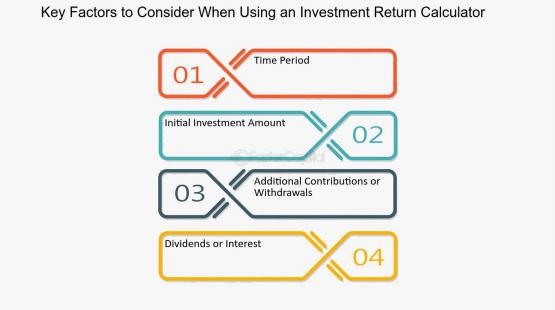
A financial tool made to calculate future investment values, the investment calculator is a planner that can help in showing the amount the funds could grow. The investment calculator can calculate the amount by inputting factors such as the initial amount, interest rate, duration, and even recurring contributions. These calculators make complicated math easy, allowing any investor to make informed decisions regarding their financial futures. With the dynamic market environment, an investment calculator might be a godsend in the process of establishing realistic financial goals and planning accordingly.
What is an Investment Calculator?
An investment calculator estimates the possible growth of an investment considering the main variables that are as follows:
Principal Amount: The principal amount or the amount invested initially.
Interest Rate: Interest rate you would expect from this investment according to the type of asset and situations in the market.
Investment Period: The years you expect money to grow.
Contributions: Regular contributions you had made in a series. This may include additions at the end of any period.
Compounding Frequency: The rate of the interest is compounded on your investment, it is consequently increases the percentage of growth. With these inputs, investment calculators represent how returns build up using compound interest. Compound interest allows the investor to gain returns on his principal amount and on any earnings amassed. Compound interest is an important financial concept because investments can grow exponentially over time.
Types of Investment Calculators

There are various investment calculators that fit a specific financial goal:
General Investment Calculators: They can estimate the growth over time for either a lump sum investment or a regular contribution.
Retirement Calculators: These allow the users to plan for retirement, estimating how much they have to save, with regard to income, age, and retirement goals.
College Savings Calculators: It is parents or guardians saving money for education expenses taking into account inflation of tuition and expected costs.
Mutual Fund Calculator: This gives projections from mutual fund investments, the fees of the funds, their performance, and returns.
Compound Interest Calculators: It is useful for fixed-rate investments as they illustrate the effect of compounding frequency on long-run growth. The specific focus of each of these calculators allows the users to plan for various financial goals. Calculators have been able to give very great advantages over investments in the sense that planning becomes very simple. Some of these advantages include:
Goals are clear: Calculators allow users to clearly visualize how their investments are going to grow, making them motivated and enabling achievable financial goals, such as buying a house, financing education, or retiring in comfort.
Optimal Investing: A set of simulations, including, but not limited to, contributions rates or investment horizons might be the best approach by which an investor settles upon an optimal strategy for attainment of the investor's goals.
Compound Effectiveness: These are instruments that clearly and readily apply compound interest growth that assists in steady savings as well as reinvestment.
Monitoring of Goal Progress: This calculator can be fed with new inputs, if he is on course to meet his goals or change, they reflect that the present financial status necessitates this.
Key Points While Making Use of an Investment Calculator

While making use of an investment calculator, there are the following points one should focus on to get the correct value from an investment calculator.
Projected returns: In real life, these are very idealistic assumptions and usually conservative because the markets are unpredictable, and such high returns would not be possible.
Inflation: Most of the calculators will calculate for inflation, which will help to better approximate the future purchasing power.
Account for Fees: Fees by your advisor, funds, and/or management can add up a great deal to returns; use a calculator that adjusts for fees.
Limitation in Investment Calculators
Although useful, no investment calculator is perfect. Most such calculators make an assumption of steady returns that could, in the real-life world, never occur at all because markets fluctuate. Taxes, fees, and even some unexpected lifestyle expenditures are assumed away. Therefore, what such a calculator spits out may only be a guide towards a more probable output but certainly not the fact. Consulting a financial advisor is always the best course whenever making any large financial decisions.
Final Thoughts:
These investment calculators make it relatively easy to plan finances as people would want to when they decide to invest. This is because the knowledge of the compound interest calculator aids one in setting tangible goals, being fully apprised of the efficacies of compounding interest, and making wise decisions makes one of the most elemental phases of any investment. Calculator use should always supplement getting real most accurate and realistic finances by consulting experts.



